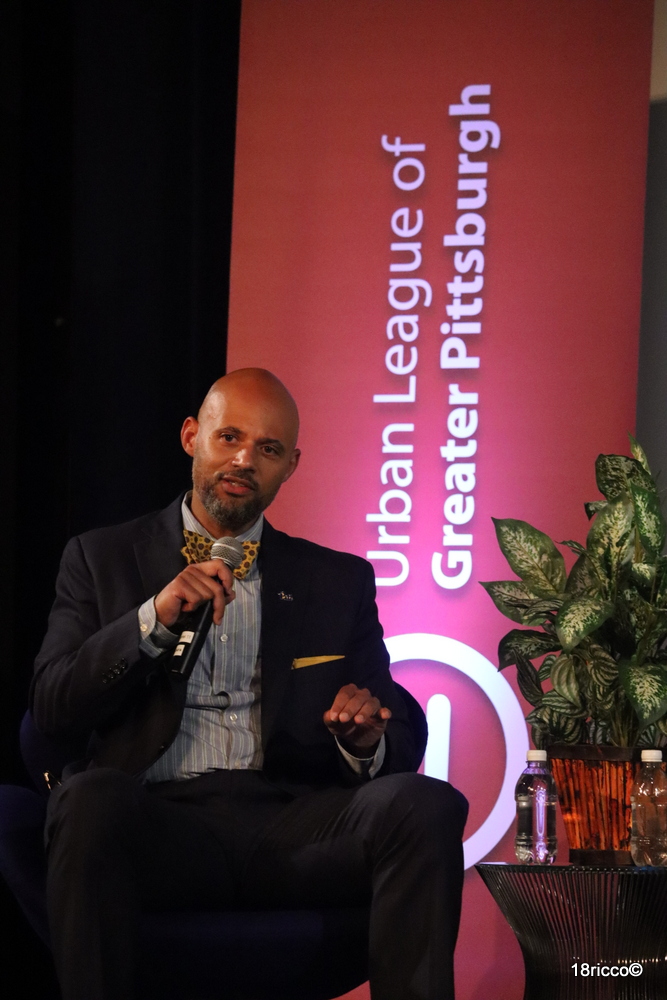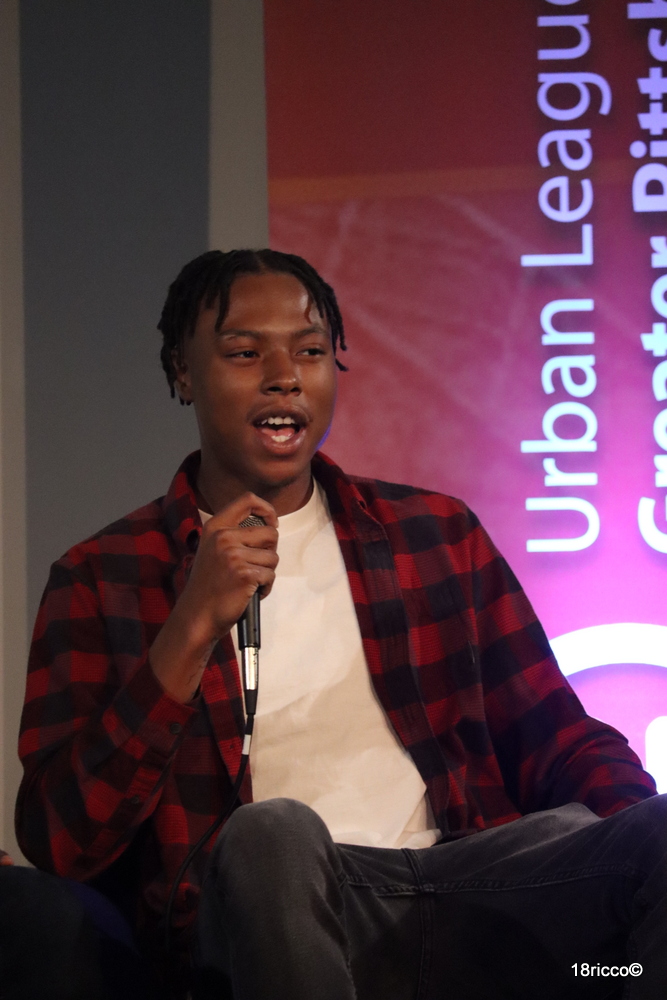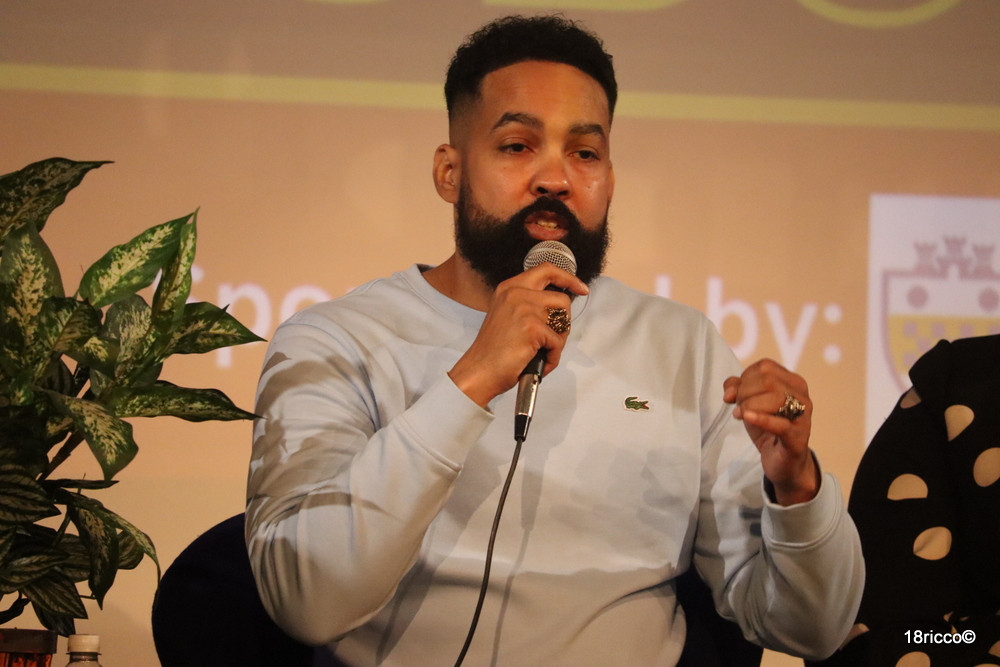TAMMY THOMPSON, EXECUTIVE DIRECTOR OF CATAPULT GREATER PITTSBURGH. (PHOTO BY J.L. MARTELLO)
Thompson: ‘Things are getting worse for Black families in the City of Pittsburgh’
The phrase, “State of Black Pittsburgh,” can elicit a number of responses.
Is it related to how Black Pittsburgh is dealing with crime and gun violence? Is it related to Blacks and jobs? The housing market? Education?
When the Urban League of Greater Pittsburgh asks, “What is the State of Black Pittsburgh?” it encompasses all of the above. For, as this year’s panelists discussed, not having access to high-paying jobs is a direct contributor to violence in Pittsburgh’s Black communities. Not having the right education can lead to a never-ending cycle of lower-paying jobs that leads to an inability to afford the rising cost of housing inside Pittsburgh limits.
The Urban League’s annual “State of Black Pittsburgh” forum was held, June 29, at the University of Pittsburgh. It was held in collaboration with the Youth ChangeMakers Conference, a product of NA (North Allegheny) for Change. June 29 was the first day of the two-day conference, with the Urban League event held that evening. High school juniors and seniors were able to attend workshops, hear speakers and network with like-minded individuals throughout the conference.

DR. CLYDE PICKETT, JASIRI X, TAMMY THOMPSON, CARLOS CARTER, MANNY TOWNSEND (PHOTOS BY J.L. MARTELLO)
The “State of Black Pittsburgh” theme was “Building Peace and Prosperity in Our Neighborhoods.” The event’s moderator was Dr. Clyde W. Pickett, Pitt’s Vice Chancellor for Equity, Diversity and Inclusion. Panelists were: Jasiri X, Founder and CEO, 1 Hood Media; Tammy Thompson, Executive Director, Catapult Greater Pittsburgh; Carlos T. Carter, President and CEO, Urban League of Greater Pittsburgh; and Manny Townsend, a 21-year-old who brought the perspective of today’s young people to the panel.
Each individual had no problem with being candid. Thompson said she saw the theme of the discussion and put it bluntly: “We have to understand we will not have peace without prosperity. We’re not going to eliminate or reduce crime in our neighborhoods until we get really serious about investing in the prosperity of the Black folks in this city and in this county.”

DR. CLYDE PICKETT
It’s no secret that African Americans in Pittsburgh are in a much worse financial position, overall, than their White counterparts. Data from The Pittsburgh Foundation found that 36 percent of Blacks in Pittsburgh have a 0 percent net worth, compared to 11.5 percent of Whites. Also, the Brookings Institution found that of the more than 42,000 businesses in the Pittsburgh region, 1 percent of them are Black-owned.
A degree in rocket science is not needed to know that Pittsburgh is losing more of its Black population. In East Liberty, for example, African Americans have exited en masse, spawning the term “gentrification” used by not only some African Americans, but even Caucasians.
“I’m very transparent about who I am and where I’ve been,” Thompson said. “As a mother of five, there is nothing that I wouldn’t have done to feed them. Things are getting worse and worse for the Black families in the City of Pittsburgh; that’s just the reality.”

MANNY TOWNSEND
Overall, Thompson and Townsend said that when a person is in poverty, they could be desperate to the point of doing things that mainstream America may view as bad.
“Desperation leads people to some incredible places, to decisions that those who haven’t experienced hunger and homelessness over and over again would never do,” Thompson said.
Carter said the Urban League preaches partnerships to get people closer to economic self-reliance. “We had one young man who was working two jobs, taking care of his daughters, he faced many barriers but had many opportunities,” he said. Carter expressed that the Urban League connected the man to the Trade Institute of Pittsburgh, where he was able to learn about new careers that earned higher incomes. “Equity is so important. Equality is giving everybody a pair of shoes, equity is making sure they have a pair in their size. Some of our folks are in a 100-yard dash, but others are (starting) on the 50-yard line.”
For Jasiri X, he wants to see more creativity from all constituents to increase prosperity and peace for African Americans. One place where creativity is high is Newark, N.J., he said. “Newark has had historic lows in murders, 20 less murders last year than Pittsburgh,” Jasiri X said.
It’s true. While Newark and Pittsburgh essentially have the same population, Newark’s population is half-Black, about 37 percent Hispanic, and 10 percent White. Pittsburgh’s population is barely 22 percent Black, with the rest primarily White, with small percentages of Hispanics and Asians. In 2022, Pittsburgh had 21 more homicides (71) than Newark (50).
“Newark is hood…the mayor there (Ras Baraka) is a brilliant leader,” Jasiri X said.
Baraka didn’t talk about defunding the police, he actually did it, Jasiri X said. “He took five percent of the police budget and put towards the Office of Violence Prevention (and Trauma Recovery). He created a group that sat between community and police, and staffed the Office of Violence Prevention with trusted community people.”

JASIRI X
Jasiri X added: “That thinking of, ‘we’re just gonna throw more money at police’” is not enough. “We have to be more creative, more innovative, and invest in those people that have strategies that have successfully worked in our community.”
Townsend said the lack of money is squarely the cause of the violence. He said oftentimes, a young person who sees a way to make fast money will go that route if they are entrenched in the cycle of poverty.
“If you’re a student in here, find you a great mentor,” he said. “It’s cool to look at people who’s on the Internet right now, Hip-Hop stars and stuff like that for the moment, but you want longevity over temporary pleasure.”
Thompson also brought up the fact that many young African Americans have no concept of financial literacy. “When we’re not preparing our children…how credit works, or the importance of not spending more than you earn, we are setting them up for failure,” she said on the panel. “The richest schools in this state have financial education curriculums as a requirement; they also have driver’s education as a requirement.”
Carter, who formerly was in banking for 18 years, said that when Blacks are told to budget, “we have to teach people skills to create” more income streams, too. “It’s not just budgeting and finance; you need to be able to make money.”
The hour-long discussion touched on a variety of topics that all intersect—finance, education, crime, jobs.
For Jasiri X, though, he’s had enough of all the talk about if “more police” would equal “more peace” and “more prosperity.”
“Think of the wealthiest places you’ve been…do you see police?” he asked. “You don’t even see police stations in these places. It’s not police that makes our community safe, it’s resources, it’s prosperity that makes our community safe. That’s what we need, not more police.”